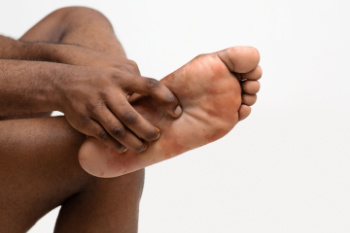 Plantar fasciitis is a common cause of heel pain, resulting from inflammation of the plantar fascia, which is a thick band of tissue connecting the heel bone to the toes. This condition often develops due to repetitive strain or overuse, common in runners, people who stand for long periods, or those with high arches or flat feet. Symptoms can include sharp, stabbing pain in the heel, especially noticeable with the first steps in the morning or after prolonged sitting. The pain typically decreases with movement but may return after extended activity. Contributing factors include wearing unsupportive footwear, obesity, and having tight calf muscles. Treatment focuses on relieving inflammation and pain. Common approaches include rest, stretching exercises, and using orthotic inserts to support the arch. Nonsteroidal anti-inflammatory drugs can also help to reduce pain and swelling. In persistent cases, corticosteroid injections or surgery may be considered. If you have heel pain, it is suggested that you visit a podiatrist for a proper diagnosis and tailored treatment plan.
Plantar fasciitis is a common cause of heel pain, resulting from inflammation of the plantar fascia, which is a thick band of tissue connecting the heel bone to the toes. This condition often develops due to repetitive strain or overuse, common in runners, people who stand for long periods, or those with high arches or flat feet. Symptoms can include sharp, stabbing pain in the heel, especially noticeable with the first steps in the morning or after prolonged sitting. The pain typically decreases with movement but may return after extended activity. Contributing factors include wearing unsupportive footwear, obesity, and having tight calf muscles. Treatment focuses on relieving inflammation and pain. Common approaches include rest, stretching exercises, and using orthotic inserts to support the arch. Nonsteroidal anti-inflammatory drugs can also help to reduce pain and swelling. In persistent cases, corticosteroid injections or surgery may be considered. If you have heel pain, it is suggested that you visit a podiatrist for a proper diagnosis and tailored treatment plan.
Plantar fasciitis is a common foot condition that is often caused by a strain injury. If you are experiencing heel pain or symptoms of plantar fasciitis, contact Dr. Odin De Los Reyes from Connecticut. Our doctor can provide the care you need to keep you pain-free and on your feet.
What Is Plantar Fasciitis?
Plantar fasciitis is one of the most common causes of heel pain. The plantar fascia is a ligament that connects your heel to the front of your foot. When this ligament becomes inflamed, plantar fasciitis is the result. If you have plantar fasciitis you will have a stabbing pain that usually occurs with your first steps in the morning. As the day progresses and you walk around more, this pain will start to disappear, but it will return after long periods of standing or sitting.
What Causes Plantar Fasciitis?
- Excessive running
- Having high arches in your feet
- Other foot issues such as flat feet
- Pregnancy (due to the sudden weight gain)
- Being on your feet very often
There are some risk factors that may make you more likely to develop plantar fasciitis compared to others. The condition most commonly affects adults between the ages of 40 and 60. It also tends to affect people who are obese because the extra pounds result in extra stress being placed on the plantar fascia.
Prevention
- Take good care of your feet – Wear shoes that have good arch support and heel cushioning.
- Maintain a healthy weight
- If you are a runner, alternate running with other sports that won’t cause heel pain
There are a variety of treatment options available for plantar fasciitis along with the pain that accompanies it. Additionally, physical therapy is a very important component in the treatment process. It is important that you meet with your podiatrist to determine which treatment option is best for you.
If you have any questions, please feel free to contact our offices located in Southbury and Farmington, CT . We offer the newest diagnostic and treatment technologies for all your foot care needs.
